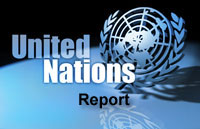UNITED NATIONS (FinalCall.com) – Unable to have an amendment adopted by the Security Council to quash an arrest warrant issued by an International Criminal Court prosecutor against the president of Sudan, the African Union and the Arab League successfully inserted language about their concerns into a resolution that reauthorized UN peacekeepers in Sudan’s Darfur region.

The August 31 vote resulted in a compromise paragraph that means the Security Council will discuss the indictment at a future time. Luis Moreno-Ocampo, an International Criminal Court prosecutor, charged Sudanese President Omar Al-Bashir with genocide in the war-torn Dafur region in mid-July. Government and rebel forces have been fighting for control of the area.
The UN action followed other attempts by the African Union and the Arab League to express concern about the indictment. On July 21, after a meeting of AU foreign ministers concluded in Addis Ababa, Ethiopia, a communiqué was sent to the Security Council saying the AU wanted to invoke a provision that would place a 12-month moratorium on the indictment.
The Arab League did the same after a July 19 meeting in Cairo, Egypt.
Both organizations stressed concerns about ICC one-sidedness when dealing with weaker states, especially in Africa. They also argued the ICC action could hinder ongoing peace efforts in Sudan.
The AU/Arab League position was debated in the Security Council chambers and in the corridors of the UN for a week.
Zalmay Khalilzad, the U.S. ambassador to the United Nations, told reporters, “We believe there cannot be impunity. The Security Council wants to see progress in Darfur,” he said.
The British and French ambassadors were saying it was too soon to discuss delaying President Al-Bashir’s prosecution.
Outside of the UN opinions surfaced that supported the West’s position. “The pending issuance of an ICC warrant for al-Bashir can provide the UN Security Council with vital leverage on Khartoum,” said Africa Action, a Washington, D.C.-based group.
“The notion that, in this case, the pursuit of justice will scuttle a peace process for Darfur is misguided,” Africa Action said.
However, the date was fast approaching for renewal of the UN mission in Darfur known as UNAMID. The AU and Arab League attempted through Libya and South Africa, rotating Security Council members, to introduce an amendment for UNAMID’s extension which included the moratorium on the Al-Bashir indictment.
Western nations held their ground. The compromise was a paragraph inserted into the peacekeeping reauthorization that noted a willingness to discuss the indictment.
With 14 votes in favor and an abstention by the United States, an 11th hour resolution was adopted to extend the 26,000 member UNAMID force. Authorized by the Security Council a year ago, UNAMID was reauthorized for another 12 months to July 31, 2009.
“The U.S. abstained because the language added to the resolution would send the wrong signal to President Al-Bashir and undermine efforts to bring him to justice,” said U.S. Amb. Alejandro D. Wolff.
Human Rights Watch, in a statement after the vote, criticized any move to delay ICC proceedings against the Sudanese president. “The U.S. decision to abstain is clearly a vote against giving Pres. al-Bashir a get-out-of jail-free card,” said Richard Dicker, director of the organization’s International Justice Program.
British Ambassador John Sawyer, whose nation sponsored the main resolution, said it was good that the council had no position on whether to act on the request to indict the president of Sudan.
“It wasn’t right to consider that issue as part of the renewal resolution,” Mr. Sawyer said.
Amb. Attia Omar Mubarak of Libya countered that the council should have honored the concerns of the AU and Arab League. The Security Council forced “Libya and others to accept consensual language, allowing the council to return to the question of the ICC action at another time,” said Amb. Mubarak.
The Russian and Chinese ambassadors used strong language in explanations of votes by their respective delegations.
By denying the amendment from the AU/Arab League, Non-Aligned Movement and the Organization of the Islamic Conference, the council snubbed two-thirds of the world’s population, said diplomat Vitaly Churkin of Russia.
“The Russian delegation has serious concerns about the negative developments that might follow from the application of the ICC requesting an arrest warrant for the Sudanese president,” Mr. Churkin said.
China supported the reasonable request by the AU and other council members to suspend the indictment, said Amb. Guangya Wang. “The indictment by the prosecutor of the ICC was an inappropriate decision made at an inappropriate time,” Mr. Wang said.
“It would undermine the relationship between Sudan and the UN; and harm the fragile security situation in Darfur,” he added.
Dr. Abdalmahmood Abdalahaleem Mohamad of Sudan said, “Today’s resolution was a positive step, and the council should continue to support the national efforts underway to ensure peace in Darfur and the wider Sudan.”
Related links:
- Is oil behind indictment of Sudanese president? (FCN, 07-22-2008)
- Sudan and America’s racist foreign policy (FCN, 06-25-2007)
- Sudan President answers questions via live satellite (FCN, 03-08-2007)
- Darfur, Sudan: Seeking the Truth (FCN Webcast, 05-07-2006)












